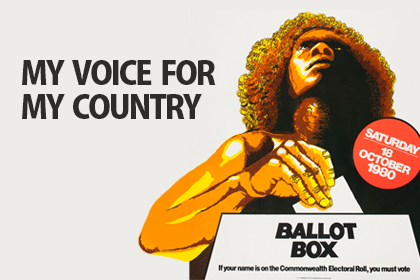Rhoda Roberts
Journalist and gallery owner Artistic Director Events, Saltwater Freshwater Festival Voice for our people

I remember the formation of the Koori Mail very clearly because my father Pastor Frank Roberts was its chairman and had talked about the idea for an Aboriginal newspaper for eons.
A young man called Owen Carriage started the newspaper but had been having a tough time because he couldn’t get funding for it. Eventually, some local Bundjaung organisations from the northern NSW region came on board and, with some help from ATSIC, the birthing of a 100 per cent Aboriginal community owned newspaper was on its way.
My biggest memory of the Koori Mail is around the one-year anniversary, when an Aboriginal media conference was held. I was working in TV at the time and had recently done a story around how our women often had to go through mainstream legal aid in domestic violence and custody issues because their partners were black and Aboriginal legal aid had a policy of not representing black on black.
It was a really hard story to do, showing our women to be disadvantaged in the legal system.
At the time, it was taboo to even admit we had such issues as domestic violence in our community. I presented the story I had run on TV to the forum and spoke about being a reporter who had to hold the middle ground and understand our code of behaviour and not take sides.
Two rows at the conference were made up of white academics and then, of course, there was our mob.
During my presentation, several very well-known Aboriginal men in the arts and media industry stood up and walked out of the room. The only man remaining in the room was my dad.
I remember standing my ground that women had a right to talk about this, but our men were furious. I was basically told �?How dare you air our dirty linen in front of white people’. �?You’ve told a story that will incarcerate more men’, they said.
It all made me realise the power of the media. That evening, there was a ball and I had decided not to go. I sat in the car crying as my dad drove me home and he put his hand on my knee and said �?Come on sis, you’re tougher than that. Pick yourself up. If you don’t go, you’ll have agreed that you shouldn’t have done the story’.
In the end, I went and circumstances were that I was asked and agreed to MC the ball. The keynote speaker that night was my father and it was the most honourable thing for me to introduce him on that important anniversary.
Even now, I can’t find the words. I just stood there and was so incredibly proud. Everyone on the board at the time were my uncles, including late uncle Charlie Harris and Charlie Moran. It was wonderful to look around and see my Elders that I knew so dearly as the board of this amazing paper.
The next evening, my father passed away.
He had always said �?If we had a paper, we’d have a voice that we could use to educate the broader community’, so when my father passed, it was almost like he was saying �?I have done everything I set out to achieve’.
That’s why the Koori Mail is so closely linked to my psyche. It still means the world to me and I love the fact that it’s still in Lismore (northern NSW), it’s national, it’s sound and ethical, it’s 100 per cent owned by the community and it has increased its readership and gone from strength to strength. So many people read other things like the poetry in the Koori Mail, and then there are letters from prisoners. People have been genuine about it. It’s a paper that empowers our youth especially, but virtually anyone can open it up and learn from it.
It’s a really hard thing to be something to everyone but I feel the Koori Mail has achieved it. It shows that we truly have come a long way.




